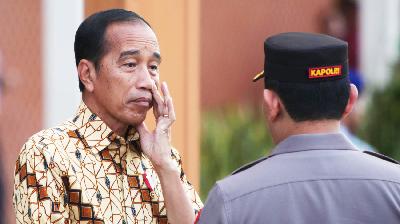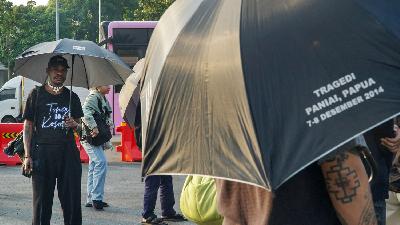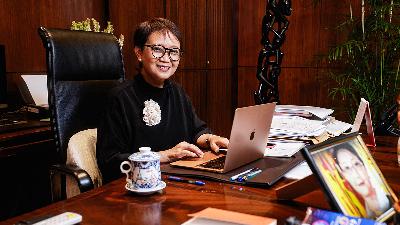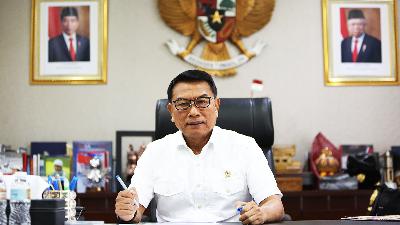A Decade of Declining Democracy
Monday, July 29, 2024
During his two terms in office, President Joko Widodo slowly but surely pulled back the progress of democracy. By the end of his rule, Indonesia transformed into a country characterized by autocratic legalism.
arsip tempo : 174660757388.
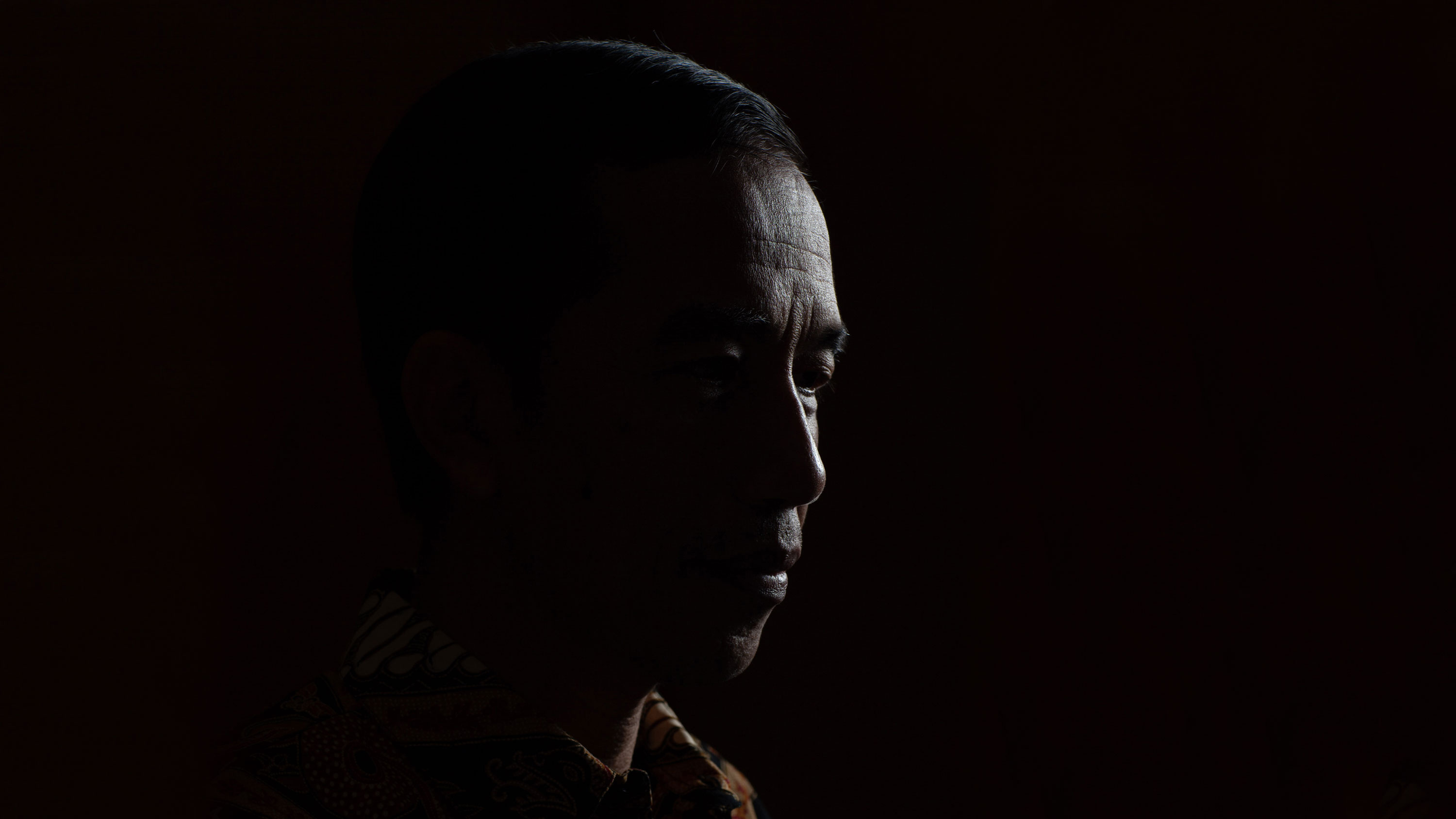
MANY people thought Joko Widodo’s rise to power was a victory for the common people. His background, not coming from an elite family, was in stark contrast to Prabowo Subianto, his opponent in the 2014 presidential election, who was a former son-in-law of President Suharto and the son of a minister from both the Old and New Order regimes, Sumitro Djojohadikusumo. As Prabowo’s antithesis, Jokowi was considered by the majority of Indonesian voters as more likely to lead the republic away from the shadows of the corrupt and authoritarian New Order.
This image was reinforced by his leadership style as Mayor of Solo and Governor of Jakarta. He could suddenly appear in markets, sewers, or government offices for snap inspections. Through blusukan (impromptu visits) and his informal communication style, Jokowi portrayed himself as someone close to the people and against the complex bureaucratic system. In this way, Jokowi also depicted himself as the antithesis of his predecessor, President Susilo Bambang Yudhoyono, who seemed less agile and distant from the public.
At the beginning of his administration, Jokowi appeared promising. Some of the promises he made during his campaign, known as Nawacita, became nine government agendas that appeared to be reformist. It was clearly stated that he was determined to “build a clean, effective, democratic, and trustworthy governance.” He also aimed to “continue the consolidation of democracy through the party system, elections, and representative institutions.” In another point, he declared “reforming the system and law enforcement that is free from corruption, dignified, and trustworthy.”
The 2015 Democracy Index released by the Economist Intelligence Unit, the research and analysis arm of The Economist, reflected this optimism. In that year, despite ranking 49th, the same as in 2014, Indonesia’s democracy score slightly increased to 7.03 from 6.95. Civil liberties, one of the components evaluated in the index, were rated at 7.35 in both 2014 and 2015.
Nine years later, in 2023, our democracy ranking and score on the index are worse than in Jokowi’s first year in office. Indonesia’s democracy ranking fell to 56th with a score of 6.53. The civil liberties score plummeted to 5.29. Perhaps in the 2024 data, published in early 2025, the ranking will be even worse. The 2023 index does not yet reflect the process and results of the 2024 General Elections, which are considered the most brutal and worst election since the Reformasi era due to Jokowi’s intervention to secure the victory of his son as vice president.
Assessments by several other institutions regarding Indonesian democracy are similar to the research by the Economist Intelligence Unit. At the end of Jokowi’s two-term presidency, Indonesia experienced democracy backsliding. Unlike the classic pattern, such as a coup that drastically changes the system, the decline in democracy we experienced happened slowly and went unnoticed by many people. Political scientist Nancy Bermeo refers to this phenomenon as executive aggrandizement, as seen in Turkey and Ecuador.
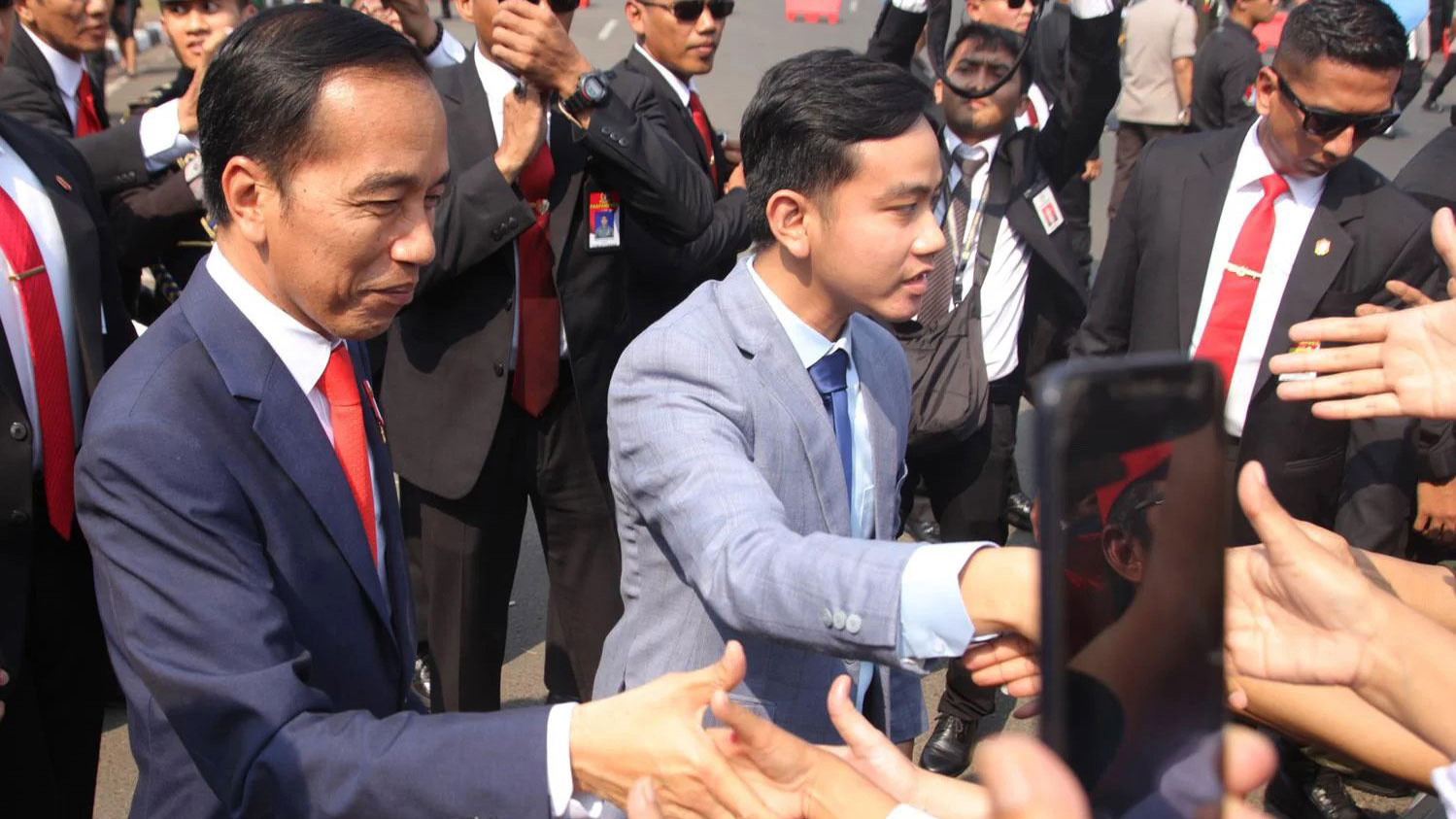
President Joko Widodo and son, Gibran Rakabuming Raka, greet residents near the Merdeka Palace, Jakarta, October 2019. ANTARA/Rachman
Slowly but surely, Jokowi reversed the progress of democracy and eroded various achievements of the 1998 Reformasi. Initially, he consolidated political parties so that the government coalition would have a majority in the House of Representatives (DPR). By the end of his first term, the Corruption Eradication Commission (KPK) was weakened through revisions to its law. Further weakening was done by pushing for the election of KPK leaders lacking integrity to be elected by the DPR.
At the start of his second term, Jokowi and politicians in the DPR swiftly amended the Constitutional Court Law. This revision paved the way to control the Court by changing the composition of the judges so that more than half of them would side with the parliament and the Presidential Palace. With the weakening of the three executive oversight institutions—the DPR that blindly follows the government, a weakened KPK, and a Constitutional Court that tends to side with the authorities—Jokowi has run his administration almost without checks and balances.
Jokowi argues that democracy is doing fine, people are still free to criticize, and elections are held democratically. This is precisely how executive aggrandizement works: democracy becomes merely an illusion. Meanwhile, the pillars of democracy are slowly being undermined and waiting to collapse. Institutions such as the KPK and the Constitutional Court still exist, but their mandates and powers are stripped through laws. By the end of Jokowi’s administration, we have unknowingly become a country characterized by autocratic legalism.
•••
NEARING the end of Joko Widodo’s second term in office, on October 20, we decided to take a look at his promises, examine what he has accomplished, and present it in a special edition. The 10 Years of Jokowi special edition is published to commemorate the General Election Commission’s announcement of Jokowi’s victory in the 2014 presidential election on July 22.
The editorial meeting agreed that the overarching theme of this 10-year Jokowi administration edition is the reversal of democracy, serving as a reminder that democracy needs continuous nurturing and struggle. It is also a warning that the current democratic decline could worsen. Several laws currently being discussed in the House of Representatives could bring us back to the starting point of the Reformasi.
We have been preparing this edition for more than three months. To gather initial information, we held more than 10 focused discussions with legal experts, economists, political observers, anti-corruption activists, human rights defenders, and environmental activists. These discussions strengthened our thesis that the decline of democracy during Jokowi’s era is real.
From these discussion sources, we obtained a picture of various mistakes made by Jokowi, from reinforcing political dynasties to weakening anti-corruption efforts, from narrowing civil liberties to forcing the construction of the Nusantara Capital City (IKN). We identified 18 wrongdoings by Jokowi, twice as many as the number of promises for change and improvement as found in the Nawacita.
We also met with dozens of sources in the field to get close-up stories of how democracy is being eroded or planned to be hijacked. One of them is Andi Widjajanto, former Cabinet Secretary and Governor of the National Resilience Institute (Lemhanas). Andi openly discussed his role in efforts to extend Jokowi’s power. He also recounted when Jokowi ordered him to conduct studies on the matter, whether through extending the presidential term or adding another term of office.
One of our journalists retraced the steps of Jokowi’s political dynasty in Solo, Central Java, in mid-July and met with people close to his family. This time, they were more open about Jokowi’s scenario of pushing his children and son-in-law to become regional heads. Other sources, who usually spoke sparingly, were willing to speak more this time. One of them was former Coordinating Minister for Political, Legal, and Security Affairs, Mahfud Md., who shared stories behind various legal policies of Jokowi.
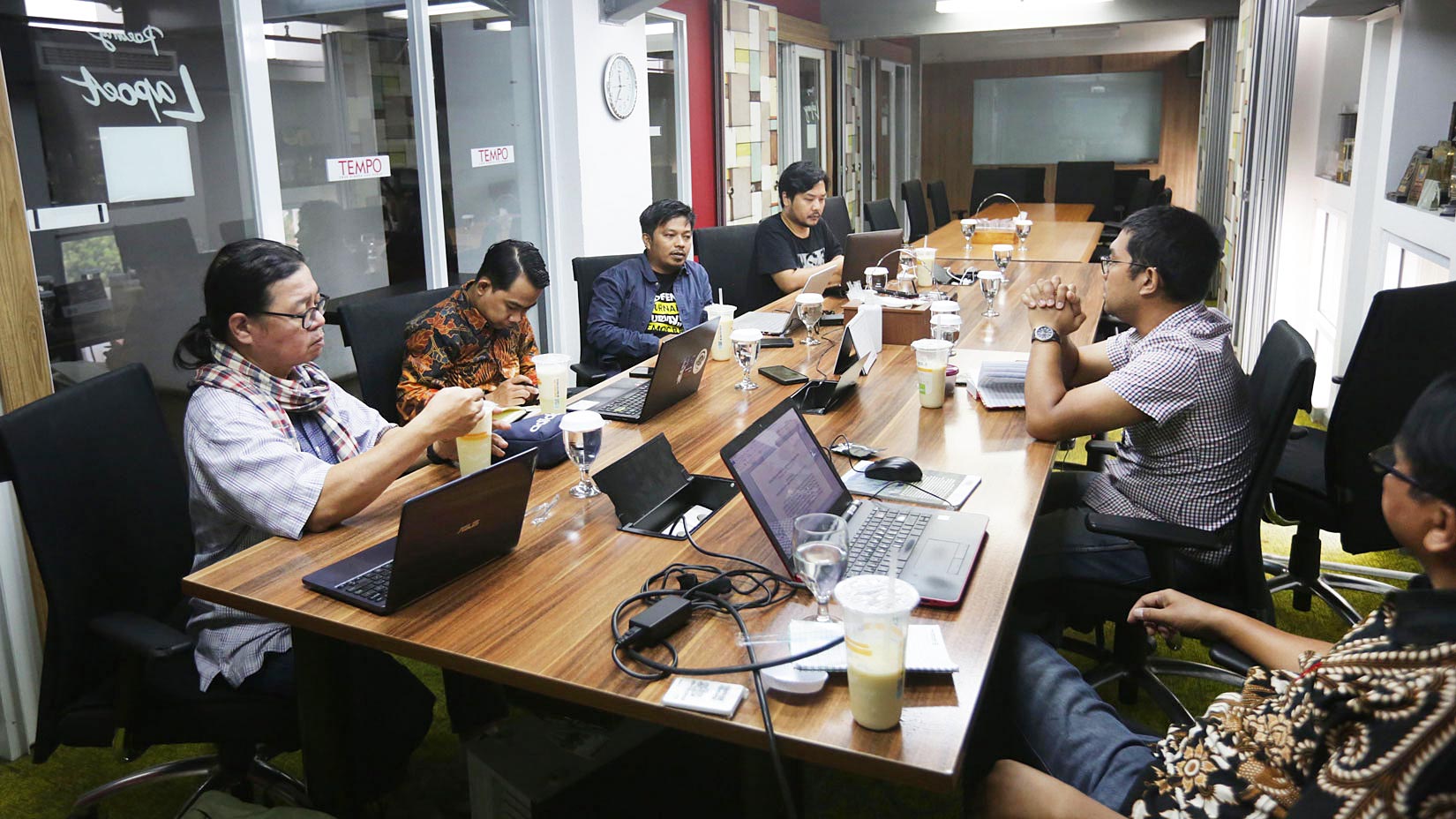
(L-R) Multimedia Nusantara University (UMN) lecturer Ignatius Haryanto, Executive Director of the Press Legal Aid Institute (LBH Pers) Ade Wahyudin, and Chair of the Advocacy Division of AJI Indonesia Erick Tanjung during a discussion to prepare Tempo’s 10 Years of Jokowi Special Edition at the TEMPO Media Group office in Palmerah, Jakarta, June 27. TEMPO/Subekti
To gain different perspectives, we sought views from government representatives. To enrich readers’ understanding about the achievements of the Jokowi’s administration, we also requested in-depth interviews with several government officials.
We have also given President Jokowi the fullest opportunity to provide his explanation. We submitted our letter repeatedly, including through the Head of the Presidential Secretariat, Heru Budi Hartono, in mid-June. He confirmed that the letter had reached the President’s desk. However, until the deadline of this edition, Jokowi has not given time for a special interview. Tempo journalists posed questions in various doorstop interviews. But Jokowi has only answered a small portion of the questions we prepared.
This is a portrait of various conditions after 10 years of Jokowi’s rule. Jokowi’s Nawacita has turned into multiple sins. Happy reading.




